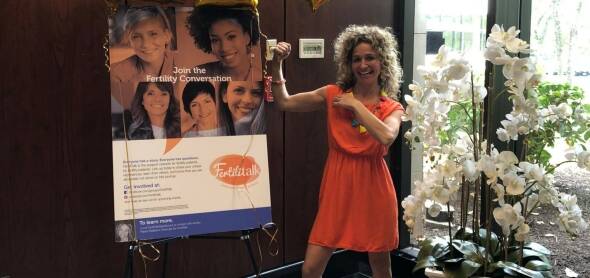She built it, and they came. To the Facebook group FertiliTalk, that is.
FertiliTalk, a closed support group for women currently or previously struggling with infertility, just celebrated its 2,000th member, counting women from Australia, Dubai, France, Italy, Spain and the continental U.S. among its close-knit community.
Women use the group to share their emotions, ask questions, lean on one another and keep track of the various stages of their journey, from the first appointment to an IVF cycle and a healthy pregnancy.
“We are so grateful to help just one woman get the support she needs that having grown to 2,000 members is very humbling,” said Annika Levitt, who founded the group in 2014.
“Our message has always been that we offer inspiration, faith and hope for patients, by patients, and the more people we have to share those values, the more powerful the impact.”
“It’s a special week!”
Levitt isn’t feigning her enthusiasm – the 4’11, 95-lb curly haired blonde is usually this bubbly, excited and full of life. And even though that’s her natural disposition, she has reason to celebrate – she was able to give birth to two children – a girl and a boy – through IVF at RMA in 2011 and 2013. She calls them her “miracle babies.”
After her second born, Levitt realized she wished she had a support network throughout her journey. She wanted more than anything to talk to someone who’d been through it so she could emotionally connect through shared experience.
“That’s when I decided to start FertiliTalk,” Levitt said about the group, which is open to anyone struggling with infertility around the world, regardless of where they receive care.
The group began with just three members including Levitt, but soon, thanks to her ability to promote the group through word of mouth, inside RMA clinics and by hosting bi-monthly get-togethers like yoga on the beach or coffee shop meetings, FertiliTalk kept expanding.
“It really took off,” Levitt said, “because it’s not just about connecting in a safe, comfortable place – it’s about saying ‘I get it, I truly get it.’”
“When we all get together, women usually break out into groups based on their experience. You’ll have the egg donors bonding in one corner, women who’ve had an ectopic pregnancy in another corner, and those considering IVF in another.”
Once online, women share all sorts of things, including their genetic screening results, their reactions to hormones and medications, questions about the benefits of acupuncture, how to navigate insurance coverage or cope with a friend’s baby shower, how to prepare for transfer and retrieval, or, in the event of a loss, how to find the strength to do it again. The group has even resulted in lifelong friendships offline – a group of five women who got close through FertiliTalk all had babies through IVF around the same time and now count each other as family. Another pair of women whose families were raised in the same small village in India found each other on FertiliTalk.
“It’s really incredible the bonds we’ve been able to build with this group,” Levitt said. “I just wish it was around during my journey – I needed it.”
That journey started in 2011, when a 31-year-old Levitt (she is now 37) began trying for a baby with her husband. After a year with no success, she booked an appointment with RMANJ founding partner Dr. Paul Bergh and got some surprising news: a genetic test revealed Levitt and her husband were both carriers for carnitine deficiency. The condition can cause major problems during infancy, such as brain dysfunction, a weakened heart and muscular problems.
“The chances of having a healthy baby were pretty low,” Levitt said, “so we went right to IVF.”
But that wasn’t so straightforward, either, as her first retrieval was unsuccessful.
“I had a lot of follicles, but when they went in, they were all empty,” Levitt said. “It’s like buying a dozen eggs, breaking them open and seeing nothing inside.”
Her second attempt worked, and in April 2011 Levitt gave birth to her daughter Jenna, now 5, and froze the rest of her embryos. In 2013, she used one of them to give birth to her son, Jacob, now 3.
And even though FertiliTalk wasn’t around when she needed it, managing the group has been therapeutic and purposeful, she said.
“Because the experience never really leaves you, women who have been through it want so much to give back.”
In that case, here’s to the next 2,000.
Want to read more about FertiliTalk? Read this blog and learn how a group of women became BFFs after meeting on FertiliTalk.
To join FertiliTalk, click here.
MAKE AN APPOINTMENT
